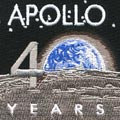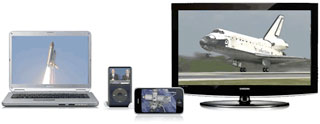 Rocket: Falcon 9 Payload: Dragon Date: June 4, 2010 Window: 11 a.m.-3 p.m. EDT Site: SLC-40, Cape Canaveral, Florida 

|
Mission Status Center
Welcome to Spaceflight Now's live coverage of the inaugural Falcon 9 rocket launching a Dragon test unit on a demonstration flight. Text updates will appear automatically; there is no need to reload the page. Follow us on Twitter. FRIDAY, MAY 28, 2010
SpaceX says their Falcon 9 rocket launch has been pushed back to no earlier than June 4 to give the Air Force and FAA more time to review documentation on the vehicle's flight termination system.
WEDNESDAY, MAY 26, 2010
The earliest the Falcon 9 rocket could blast off from Cape Canaveral is June 2, as the Air Force and Federal Aviation Administration continue reviewing the vehicle's flight termination system.
A SpaceX spokesperson announced the new target date late Tuesday, but the Falcon 9's ultimate appointment on the Air Force Eastern Range will depend on the conclusion of the paperwork reviews and other launch traffic at the Cape. Ken Wong, manager of the FAA's licensing and safety division, said the agency issued SpaceX a commercial launch license for the Falcon 9 rocket earlier this year. But the FAA and the Air Force are both responsible for the safety of the public and third-party property that could be put at risk during the launch. "What we're doing is we're reviewing some test documentation related to the flight termination system to ensure compliance with FAA licensing requirements," Wong said in an interview Tuesday. Air Force officials were not available for comment Monday or Tuesday. Wong said the issue is with several components of the destruct package, which includes linear-shaped charges along the length of the rocket. If the booster flew off course during launch, safety officials could trigger the mechanism to destroy the rocket before it threatened people. SpaceX says it is working with Ensign Bickford Aerospace and Defense Co. to resolve the issues and gain approval for launch. Ensign Bickford is the prime supplier of the Falcon 9 flight termination system. Wong declined to identify the specific parts under the most scrutiny, and he would not estimate when the reviews could be finished. "If you have a vehicle which has launched several times, where you have a flight termination system that has already completed qualification testing, then in subsequent launches, you would not have as many test-related issues with the flight termination system," Wong said Tuesday. "In the case of Falcon 9, where you have a new vehicle with a new flight termination system, that's why you get a lot more of these testing issues and things that have to be reviewed," Wong said. Launch and landing activity at the Cape has range assets booked this week and in parts of early June, further complicating SpaceX's plans to debut the 15-story rocket. WEDNESDAY, MAY 19, 2010
Air Force officials say SpaceX has requested May 27 and May 28 to launch its first Falcon 9 rocket, if safety managers approve the booster's destruct mechanism in time.
The May 27 date would conflict with the planned landing of the shuttle Atlantis May 26. It takes up to 48 hours to reconfigure tracking and communications assets between operations at Cape Canaveral, likely putting the first Falcon 9 launch attempt no earlier than May 28. SpaceX has also moved the launch window for the mission. The window will now open at 11 a.m. EDT and close at 3 p.m. EDT, two hours earlier than previously planned. The launch date hinges on the Air Force's approval of the Falcon 9 rocket's flight termination system, an explosive charge along the length of the booster that would destroy the vehicle if it encountered problems and flew off course. "SpaceX is working closely with Ensign Bickford to complete testing of the explosive elements of the FTS system, but there are other components, such as the FTS radios, antennas and the transponder that come from other suppliers as well," the company said in a Web update earlier this month. "All of these components must be qualified specifically for our flight environments, so unfortunately, it is not simply a case of buying 'off the shelf.'" The company says it is submitting the results of the testing to the Air Force, which will issue final approval of the destruct system. SpaceX is not setting an official launch date until the testing is completed, but it provides occasional updates to the Air Force Eastern Range, which oversees the Florida spaceport. TUESDAY, MAY 4, 2010
The first launch of the Falcon 9 rocket will likely occur May 23, at the earliest, due to qualification testing of a component in the vehicle's explosive Flight Termination System.
But SpaceX has asked the Air Force range at Cape Canaveral to be allowed to launch as early as May 16 or 17, if those dates become available. The Florida range schedule is tight this month, with the planned launches of the shuttle Atlantis on May 14 and a Delta 4 rocket on May 20. Atlantis' landing May 26 will also require range support, which takes about two days to reset between launches and landings. According to Air Force officials, SpaceX has requested May 23 on the range and the first right of refusal for May 16 and 17. SpaceX leaders caution the prospective launch dates are just placeholders. Launch will not occur until qualification testing on the Falcon 9's destruct package is completed. The critical path item is currently the safe and arm device, SpaceX founder and CEO Elon Musk said in an e-mail. FRIDAY, APRIL 30, 2010
SpaceX is planning to launch their first Falcon 9 rocket no earlier than May 11, but the flight could slip until at least late May as the Air Force continues reviewing the private booster's destruct package.
The launch window for the flight has also changed. The 15-story rocket can lift off between 1 p.m. and 5 p.m. EDT each day, according to Air Force officials. SpaceX officials will not confirm target launch dates for the high-stakes test flight. The Air Force Eastern Range, which oversees launches from Cape Canaveral, has not approved the rocket's Flight Termination System that would destroy the Falcon 9 if it flew off course after liftoff. "There is not much point in stating a date until uncertainties around the FTS qualification are resolved," Elon Musk, SpaceX's founder and CEO, wrote in an email this week. "It would imply a greater degree of accuracy than is possible." "The range does make us come up with a date, but that is simply an 'earliest possible' guess," Musk said. The earliest the Falcon 9 could launch is now May 11, but that is only a planning date and has not been approved by the range. If SpaceX is unable to launch by around May 12, there are only a handful of launch opportunities during the rest of the month. The shuttle Atlantis is scheduled to launch May 14, a Delta 4 rocket is booked on the range for May 20, and Atlantis is due to return to the Kennedy Space Center around May 26. It takes about 48 hours to reconfigure the range's communications and tracking assets between launches and landings, leaving few openings in the Florida launch manifest for the Falcon 9 unless other missions are postponed. MONDAY, APRIL 19, 2010
Top SpaceX officials say Friday's wet dress rehearsal of the Falcon 9 rocket went smoothly.
According to SpaceX founder and CEO Elon Musk, the cork insulation that caused trouble during a previous tanking test performed very well. "No debonds this time and the EMI test also completed successfully. A word of thanks should go to NASA and our resin supplier for helping our structures team solve this problem," Musk said in an e-mail. The EMI, or electromagnetic interference, testing checked compatibility between the rocket and ground communications systems, tracking radars and other assets. The Falcon 9 rocket uses cork as a heat shield as the first stage plunges back into the atmosphere following its three-minute burn during launch. SpaceX plans to recover the first stage for analysis and potential reuse. Liftoff of the new 15-story booster is scheduled for May 8, at the earliest. SpaceX is developing the rocket for cargo flights to the International Space Station. "At this point, the launch timing is just a matter of waiting for the [qualification] tests to complete on the flight termination components. First half of May still looks promising, but that depends on how the tests go, most of which are out of our hands," Musk said. The Air Force, which oversees the safety of rockets launching from Cape Canaveral, requested SpaceX perform testing of the Falcon 9's destruct system to make sure it can destroy the booster in the event of mishap. Air Force officials say they have not issued final approval for the Falcon 9's launch. That decision will wait until the flight termination system testing is completed. FRIDAY, APRIL 16, 2010
SpaceX loaded propellants into the Falcon 9 rocket again Friday, one day after President Obama briefly toured the booster's launch pad during his visit to the Kennedy Space Center.
Officials say the second tanking test, also called a wet dress rehearsal, was planned to verify new cork insulation remains adhered to the 15-story rocket during tanking. It also gives the SpaceX launch team more practice before the Falcon 9's first flight, which is scheduled for no earlier than May 8. SpaceX rolled the Falcon 9 from an assembly hangar and lifted it vertically at Complex 40 earlier this week. President Obama received a personal tour of the launch pad Thursday before delivering a speech defending his vision for NASA, which includes more reliance on commercial companies like SpaceX. Read our full story. SATURDAY, APRIL 3, 2010
The earliest the Falcon 9 rocket could take off on its first flight is May 8, SpaceX announced Friday.
The company says it is still testing parts of the rocket's self-destruct system that would destroy the booster if it ran into problems during launch. "SpaceX is working closely with Ensign Bickford Aerospace & Defense Co., supplier of key components of the Flight Termination System (FTS) that will be used on Falcon 9, to complete testing of the FTS hardware and provide final data to SpaceX and Air Force Range safety officials for review and acceptance," SpaceX said in a written statement. The Falcon 9 will carry linear-shaped charges along the outside of the vehicle that would be detonated if the rocket flew off course. The Air Force oversees launch operations at Cape Canaveral, Fla., the launch site for the Falcon 9 rocket. "Certification of the Falcon 9 FTS and subsequent range availability will put the first Falcon 9 test launch towards the latter half of the anticipated March-May window, with the first attempt no earlier than May 8, 2010," the statement said. Read our earlier status center coverage. |
 The Falcon 9 rocket will launch on a test flight. See our photo galleries: Rocket assembly inside hangar | Falcon on the pad | Engines fire for test | Rollout before launch  
Space video for your computer, iPod or big screen TV
Experience the space program like never before become a subscriber today |